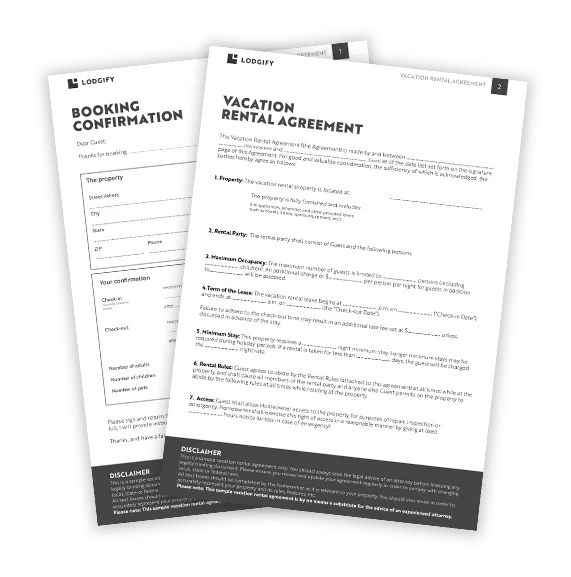Hosting guests at your vacation rental property isn’t just about offering a cool space. You also need to ensure a smooth, stress-free stay for you and your guests, and that’s exactly what a short-term rental agreement can help with.
A great vacation rental contract could be the difference between a positive guest experience and a vacation rental horror story. So, if you don’t have one yet, it’s time to add a short-term rental agreement to your list of host essentials. By having a clear outline in place, you’ll protect both your property and your guests.
Before drafting up your vacation rental contract, it’s helpful to understand that all rentals are different, and therefore the terms and conditions vary from property to property. While you’ll ultimately want to customize any short-term rental agreement you create, we’ve created a free vacation rental agreement template to help you get started.
Download it below, and then keep scrollin’ to learn about all the essential elements your rental agreement shouldn’t miss.
Don’t see the form to download the Rental Agreement Template? Click here.
DISCLAIMER: This is a sample vacation rental agreement. Please ensure you seek the advice of an attorney before finalizing any legally binding document. Your short-term rental agreement should be revised and updated to adhere to changing local or state laws.
What is a short-term rental agreement?
Whether you hear it called a vacation rental contract or a short-term vacation rental agreement, they’re all different names for the same form — a short-term rental agreement. It’s a formal document between the host and their guests, where the property owner outlines the host’s and guest’s expectations and responsibilities.
This contract is for both parties’ use and defines the purpose of the stay. For the guest: it’s tourism or leisure on a temporary basis, and for the host: the exchange of the property for economic compensation.
The vacation rental agreement legally binds the host and the guests, clarifying in writing an agreement that must be followed and fulfilled by both parties.
For this reason, a short-term rental contract is key in protecting both the host and the guests in case of any discrepancies or disputes. It provides you with additional protection and peace of mind when renting your vacation home to complete strangers. If problems arise, a vacation rental contract can help you demonstrate that guests understood the conditions and rules of use in advance.

Who is the short-term vacation rental agreement for?
The short-term rental agreement is intended for both parties, but the host and guest play different roles and have different sets of expectations when it comes to the holiday rental agreement. Here’s how.
Guests
A vacation rental agreement lets guests know what is expected of them regarding property care, checking in and out, and overall responsibilities during their stay. This is especially important if you offer an alternative vacation rental, such as a yurt or tree house, that might require extra care or specific instructions for property use.
Hosts
This agreement holds you, the host, accountable and responsible for your guests’ stay. A short-term rental agreement clarifies your role to your guests. For example, if there are only certain times they can reach you or if you have a special procedure for handling check-out, this should be made known to guests by the host in the agreement.

Different names for vacation rental agreements
It’s not easy keeping up with all the terms in the vacation rental industry. To avoid confusion, we’ve compiled a list of names that vacation rental agreements are known by to assure you that they’re all the same thing:
- Vacation rental short-term lease agreement
- Short-term rental agreement
- Short-term house rental contract
- Vacation rental contract or short-term rental contract
- Vacation lease agreement
- Short-term residential lease agreement
Why do you need a vacation rental contract?
As cumbersome as it may sound, having a vacation rental agreement is essential for your business, your guests, and yourself. Most hosts shy away from diving too deep into the legality of a vacation rental agreement, as the paperwork can be tedious and time-consuming. Regardless of the initial effort required, the payout is well worth it. Here’s why…
Protect your property
“But what about my vacation house rules?” some hosts might wonder. Your house rules are also essential and help keep your guests informed about how to treat your property, but simple house rules won’t bind them to anything—legally, at least. House rules are more of a guide and an outline of your expectations rather than a formal agreement.
The short-term rental contract is a formal agreement guests sign stating they’ll follow the rules (and cover you even if they don’t). You have it in writing that they consented to your rules and expectations, so if they break that agreement, you have something to fall back on. This is especially important if you’re planning to file a claim through an OTA or third-party insurance, as they’ll want to see as much proof as possible.
Set expectations
Naturally, you want to be the best host possible for your guests. Nevertheless, misunderstandings and missed expectations happen. Every accommodation is different, and sometimes guests bring old standards into new spaces. Maybe in their last accommodation, they had room service or airport pick-up included, but what if that’s not the case at your property? Making things clear from the start fosters transparency and communication while setting standards and expectations.

Those standards and expectations also allow them to maximize and enjoy their stay. If they didn’t previously know that check-out was at 2 o’clock, maybe they’ll be happy to get more out of their time at your property. Guiding guests through an outline of their stay with the short-term rental agreement will keep them satisfied.
Ultimately, a vacation rental agreement is intended to keep guests and hosts on the same page.
Attract suitable guests
With the right short-term vacation rental agreement, you’re helping set more than expectations for your accommodation; you’re also showing guests what you expect of them, too, as clear vacation rental contracts provide a profile of what type of guest you’re looking for. If your property has a strict ‘no extra guests’ rule and bans parties, then a group of spring-breakers might not agree to your terms, and that’s okay!
Ultimately, you want to host guests that are suitable for and respectful of your property to ensure that everyone has a good time, yourself included. By outlining the trip guidelines in the short-term rental contract, you help to make sure you’re only welcoming guests who are a good fit for your home, saving you from future headaches or negative reviews.
Collect fees and payments without issues
Many hosts these days choose to style their stays in an “a la carte” way. That’s to say that instead of automatically including some extras in the nightly price, they add those on as additional charges only when a guest requests them.
Let’s say you offer an extra breakfast option for your guests. When you have your guests agree to the additional charges in the vacation rental contract, there’s no room for error. You’ll also be able to collect payment more swiftly, as it’s written in the agreement that they agreed to the additional charges. This saves you the trouble of chasing down your guests to pay or justify the charges.
Is a short-term rental agreement mandatory?
We know it sounds like a hassle—you’ve already listed your vacation rental rules and, in a sense, had your guests agree to your terms when they hit “book,” so what’s the point of having a short-term rental agreement on top of all the other necessary paperwork?
At the end of the day, it’s not mandatory to have your own short-term vacation rental agreement. While the specifics may vary depending on state and local laws, there is no federal mandate for vacation rental agreements in short-term rentals. An agreement may be mandatory if you’re booking through a third party. Many OTAs already have some type of agreement built into their platform.
The bottom line? While it might not be mandatory, it is highly recommended.
20+ things to include in a vacation rental agreement
As previously mentioned, you should always speak to your attorney before you write up any legally binding agreement. Below, you’ll find a list of the general questions you should aim to answer in your rental agreement. This will help you create a basic outline that you can then present to your attorney —they’ll be able to put what you want to include in the right legal terms for the document.
Property data
The most basic thing that should appear in any short-term rental agreement is the property details, including:
- The exact location
- The property’s inventory
- The current condition of the property
We recommend that you always attach a sheet with the property’s inventory to the vacation rental contract, which includes furniture and appliances and their current condition, and have your guests sign it. This ensures both parties are aware of what’s inside the vacation rental property (and what condition everything is in) in the event of any damage.
Guest data
The other essential information that should always appear in the vacation rental contract is the personal data of the guests staying there. Ask for guests’:
- First, middle, and last name
- ID, passport, or driver’s license
- Home or permanent address
- Phone number
Depending on where your property is located and the tax rules that apply to your short-term rental business, you might need a photocopy of guests’ passports or ID cards as well.
Capacity limits
Ensure your short-term rental contract includes the maximum capacity of the property. Some localities have occupancy restrictions, especially in areas that are strict about vacation rentals.
Remember that when a guest breaks these rules, the penalty falls on you, so be particularly clear about how many people can stay there. Even if you don’t exceed the legal limit, including the maximum capacity can be useful if you want to charge additional fees based on the number of guests.

Check-in and check-out times
Make it clear at what time guests can check in and out. This ensures a smooth turnover process for you and/or your cleaning staff and helps improve guest experience. If your calendar is often booked back-to-back, include details of any extra costs incurred if guests fail to check out on time to encourage them to adhere to strict check-in and check-out times.
To avoid problems with neighbors, ensure the vacation rental agreement includes the property’s quiet hours, too, so that your guests know they can’t arrive at your property at 2 a.m., dragging their bags across the sidewalk and waking everyone up in the neighborhood in the process.
Minimum and maximum stay requirements
Many owners prefer to stipulate a minimum stay for their guests to ensure that the expense and effort of preparing the accommodation upon arrival and departure are worth it. If this applies to you, this information must be included in the vacation rental contract. Adding these minimum or maximum stay requirements will prevent any issues related to high turnover or guests overstaying their welcome.
House rules
One of the most common concerns of vacation rental owners is what to do if they encounter troublesome guests or visitors who disrespect the property. Save yourself from these fears by clarifying the house rules in your short-term rental agreement. Be as explicit as you need to be, as this will be the rule book for how guests treat your home.
Prices and fees
When it comes to money, the best thing to do is to put everything in clear writing. Guests can be very sensitive about charges they feel were added without warning and reason. Avoid this issue by addressing it upfront.
Dodge misunderstandings and complaints by including a breakdown of prices and fees in your vacation rental lease. Clearly specify what is in the price and what is its amount: cleaning costs, VAT, tourist tax, etc. For example, if you ask your guests for a deposit, ensure the exact amount and the return conditions appear in the contract as well.

Accepted payment methods
What’s the use of showing a price if it doesn’t specify the conditions for payment? If you have a 3% credit card surcharge, for example, guests might be angry to find out about that additional expense. A good short-term rental agreement will contain the payment methods you accept at your accommodation and the charges accompanying them.
Our recommendation is that you stick to card payments, with a secure payment gateway, like Stripe or Payyo, in addition to those made through your vacation rental website (if you have one) and OTA platforms such as Airbnb, Booking.com, and Vrbo.
Cancellation policy
While OTAs usually have their own cancellation policies, it’s worth putting your own in your vacation rental agreement, too. You can use one from our short-term vacation rental agreement template, but regardless of the template you use, you should include the conditions under which the reservation amount (or a part) can be returned to the guests, in addition to those cases where the host reserves the right to cancel the reservation unilaterally.
Additionally, you should also include the term for and method of returning any fees already made in the case of a cancellation (for example, within three days and by bank transfer).
Signatures
Last but not least, ensure that all parties’ signatures appear clearly in the contract, along with their name, the date of signing, and the contact information to use during the stay. You might find it useful as well to have a small section for initialing every page of the vacation rental agreement to ensure guests are paying attention to the information on every page or section.

Additional clauses to include in your vacation rental agreement
More is often better when drafting a short-term vacation rental agreement. No detail is too small, so here are some extra things you might want to consider adding to your rental agreement if you want full clarity between you and your guests.
Scam bookings and cancellation terms
Not only does including a section on scam bookings help deter untrustworthy renters in the first place, but it also protects you and your property in the event the booking was made under false pretenses (i.e., for throwing underage parties, exceeding the maximum number of guests, etc.).
A few legally binding sentences outlining the circumstances under which you can cancel a guest’s stay will give you the right to evict these bad-intentioned guests immediately.
Cleanliness and maintenance
Outline the expectations for both parties, including how clean and tidy guests can expect to find your property and how neat you hope they leave it. Remember, your guests are on vacation, so be fair with these expectations in the rental agreement. They’ll be happy to throw dirty towels (and maybe even sheets) in the wash basket before they leave, but a full spring clean before check-out is not their responsibility.
Equally, you should offer guidance regarding maintenance issues, such as how guests should contact you and emergency numbers if necessary.
Host access to the property
This seems like a strange one, but in the rare case of maintenance issues or emergencies, you might need to access your vacation rental property while guests are in it. To ensure this is clear beforehand, it’s helpful to provide a clause in your short-term rental agreement that mentions you might require access to the property during a guest’s stay. State the notice you will give guests before entering (e.g., two hours, 24 hours, etc.).

Rental-specific requirements
Every property is different, and your short-term rental agreement should reflect that. You know your property and its area best, so include anything specific to your property that isn’t already featured in a downloadable template, whether that’s helpful information regarding your local climate (e.g., monsoon season, blizzards) or your property (not child-friendly, suitable for wheelchair users).
What our vacation rental agreement template covers
Our free, editable vacation rental agreement template covers all the basics you need to include in your vacation rental agreement. While it provides a great basis to start writing up your own agreement, we strongly advise you to have any legal documents verified by your business attorney before using them for your vacation rental.

In this downloadable template, you’ll find a one-page booking confirmation, providing at-a-glance information about the guest, their stay, and any money paid or still owed. The document is pre-designed with the 20+ other things to include in your short-term rental agreement mentioned in this guide, including:
- Property information (address, amenities, owner, etc.)
- Rental party details (including space to input their names)
- Maximum occupancy limitations
- Check-in/check-out terms
- Minimum stay requirements
- House rules
- Rental rates and additional fee information
- Cancellation policies
- Insurance recommendations
- Payment details
- Signatures of both parties
Depending on the type of rental you have, it’s highly likely you’ll need to add other clauses that are specific to your individual property. This could include anything from weather-related clauses to the unique features of your vacation rental or even local laws and regulations.
Formatting options for your vacation rental contract
How you choose to present the rental agreement will largely depend on your needs, your guests, and the nature of the property. Ultimately, you can give the vacation rental agreement to your guests in more ways than one, so if you’re worried that one method won’t be enough, don’t be afraid to send it in different formats.
Vacation rental agreement in PDF
The benefit of having a PDF copy of the vacation rental agreement is that there are built-in features for signatures, initials, and printing names. If you require your guest to sign or initial each page, this might be the easiest way to deliver the short-term rental agreement.
Furthermore, our vacation rental agreement template is already formatted as a PDF copy, so all you have to do is press download and done! You’ve got the short-term rental agreement copy ready to use in PDF format.
Vacation rental agreement template on Word
The vacation property rental agreement template we provide is editable, but still, you might choose to transfer this to Word if that’s your preferred platform. You can do so by manually copying the content or using an online platform to do it for you.
Add or remove content if necessary to make the most of your printable short-term rental agreement. Remember that if you send a Word document to guests, the formatting and alignment might change as different users have different versions. Make sure the signatures align correctly so the agreement is still accurate after signing.
Physical copy of your vacation rental contract
Some owners opt for a physical vacation rental agreement for their guests. The benefit of this is that you make sure everything is clear. Moreover, you’ll be ready to address any concerns about the document right there immediately.

If you’ve found it hard to chase down guests to sign the vacation rental agreement before their check-in or you prefer to meet in person for the signing, this might be the best option. Bear in mind that if you choose to deliver a physical copy of the contract, you risk having unaddressed check-in rules, as that will probably be when the physical copy of the vacation rental contract is signed.
Download your free short-term rental agreement template
Whether you’re offering a camper van, city apartment, or luxury villa, using a vacation rental agreement protects you, your property, and your guests. The initial effort is worth the long-term payout to keep your business safe from any problems while also setting expectations for guests.
The best part? You don’t have to start from scratch and create your own sample rental agreement for your vacation home. We’ve taken the guesswork out of what to put into your vacation rental contract by outlining every section needed. Download our vacation rental agreement template for free — all you have to do is customize it to fit your property needs! Get ready to start hosting with confidence.
Don’t see the form to download the Rental Agreement Template? Click here.
DISCLAIMER: This is a sample vacation rental agreement. Please ensure you seek the advice of an attorney before finalizing any legally binding document. Your agreement should be revised and updated in order to adhere to any changing local or state laws.


